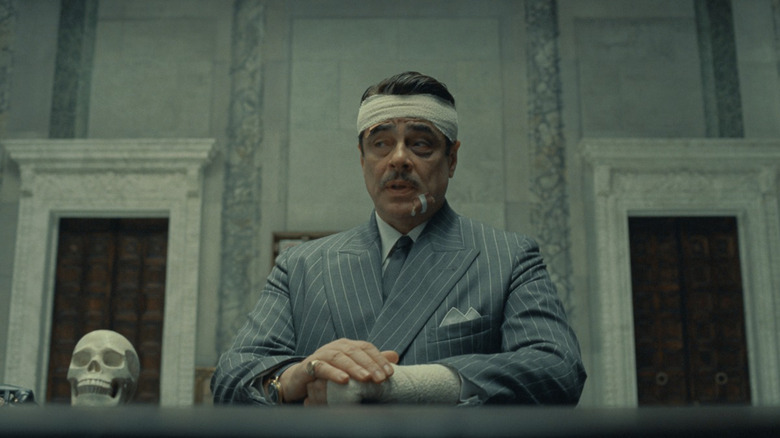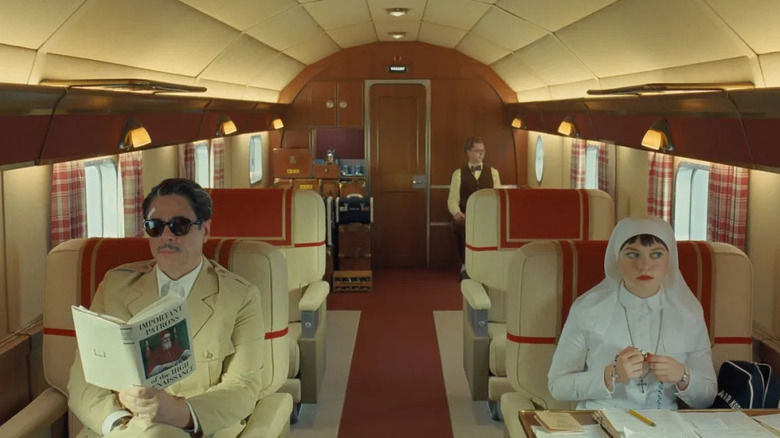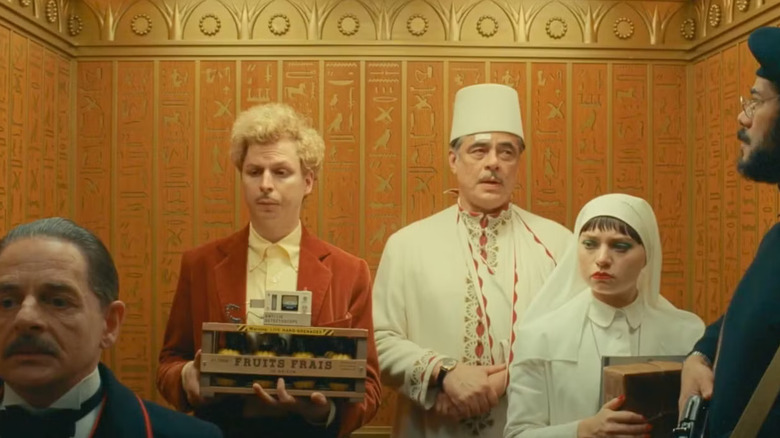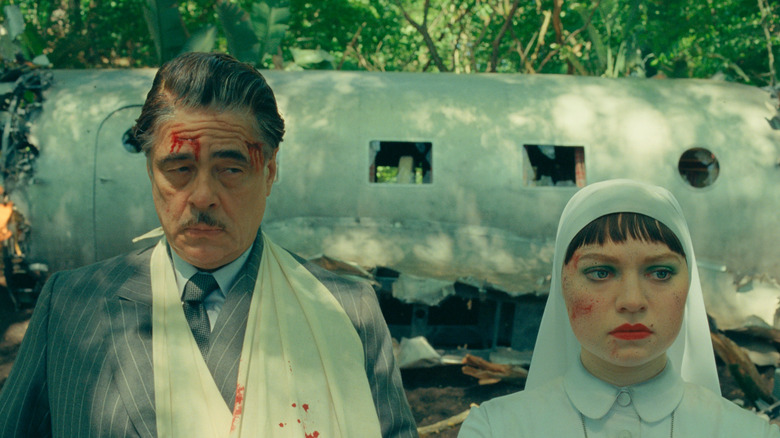The Phoenician Scheme Review: A Breezy, Hilarious Wes Anderson Romp
It's a problem that every working film critic for the last couple decades faces: how does one review a new Wes Anderson movie? The Houston, Texas wunderkind has been making his films his way for just about 30 years now, creating and perfecting a signature style that is arguably the most instantly recognizable aesthetic of any currently living filmmaker. That recognition factor is only compounded by how many people demonstrate a thorough lack of comprehension of his style. As example, take that Tik Tok trend bearing his name from 2023, a trend which purported to astutely reduce the director's twee affectations, symmetrical compositions, and arch tone down to a 30-odd second potpourri of people and objects. It was Wes Anderson as seen by the passingly familiar, essentially a bad stand-up comedian's lazy impression of an artist's entire body of work.
Yet while Anderson contains multitudes, even beneath his precisely gilded surface, there's also no question that his style is mostly set in stone. No two Anderson films are the exact same, sure, but by this point in his career, it's not looking likely that there will be any massive sea changes, either. So, what's the use in reviewing Anderson's latest work, "The Phoenician Scheme"? Anyone can tell from a single frame of the film, let alone a social media clip or trailer, that it's one more impeccably detailed building in Anderson's model village, and either such a thing excites you or repels you. Is aesthetic entropy the destiny of all artists and film series the longer they continue on? Is there a correlation between "if you like Marvel movies, you'll like this one" and "if you're not a Wes Anderson fan, don't bother?"
The answer is no — at least, not if you dig beneath the surface. For while "The Phoenician Scheme" contains all of Anderson's tics as per usual, there's a rather remarkable movie underneath it. The film mashes up a more classic Andersonian trope — the problematic patriarch — with a more recent Anderson obsession, which sees the director writing a love letter to the arts, and to filmmaking most particularly. Yet for those who found "The French Dispatch" and "Asteroid City" rubbing them the wrong way, you may want to give "The Phoenician Scheme" a shot, as it's the closest Anderson's gotten to his old comedy romps in a long time.
Anderson slides back into road movie mode
In his last few movies, including and especially "The Wonderful Story of Henry Sugar and Three More," Anderson reveled in the opportunities afforded him by an anthology structure, not just in the way it provided a revolving door of actors, storylines, and environments, but in stylistic variations, too. "The Phoenician Scheme" certainly has a lot of actors in it, and one notable aspect ratio change that also utilizes black & white photography. Yet, for the most part, the film is the most straightforward Anderson movie in quite some time.
It's 1950, and Zsa-zsa Korda (Benicio Del Toro) is a wealthy and wholly unscrupulous independent businessman who makes his living from playing all sides against the middle. He's known the world over as "The 5% Man" because he takes only 5% of the earnings from all of his deals, and it's the sheer number of arrangements he makes that allows him to profit from this. Of course, this practice makes him a lot of enemies, as well, and thus he's not only suffered the loss of several ex-wives, but has been the target of multiple assassination attempts, usually taking the form of a plane crash.
After surviving yet another plane crash, Korda decides to reconnect with his estranged (and only) daughter, Liesl (Mia Threapleton), whom he insists become the heir of his estate and businesses over his eight sons, made up of both biological and adopted boys (when pressed as to why he adopts, Korda simply says he likes "to play the odds"). Although Liesl, a nun on the verge of taking her vows, insists that her destiny lies with the convent, Korda convinces her to remain on a "trial basis." That trial involves the titular scheme, a labyrinthine ordeal concocted by Korda which intends to establish six separate ventures in the land once known as Phoenicia (a railroad here, a waterway there) which will all work in tandem with each other once completed, thus maximizing profits. When the United Nations, seeking to quell Korda, deliberately manipulates the cost of basic materials, Korda sets off to visit each of the six business partners with Liesl and Bjørn (Michael Cera), his entomology tutor — Korda believes in constantly learning new subjects — in tow, hoping to get them to renegotiate their contracts.
So, while Anderson's screenplay (working again with Roman Coppola on the story) allows him a bit of variety similar to his recent films, "The Phoenician Scheme" doesn't resemble an anthology so much as a road movie. This puts the film closer to his debut, "Bottle Rocket," and "The Darjeeling Limited," and as such, the film's emphasis is heavily on having a good, silly time.
The Phoenician Scheme is a hilarious romp buoyed by Benicio Del Toro in movie star mode
As usual, Anderson stuffs "The Phoenician Scheme" with a cadre of actors more than willing (and highly capable) to take on his deadpan, Hawksian patter. Most of these are Anderson veterans — Tom Hanks, Bryan Cranston, Richard Ayoade, Mathieu Amalric, Jeffrey Wright, Scarlett Johansson, Benedict Cumberbatch, Rupert Friend — and they're delightful as ever. Newcomers Riz Ahmed and Hope Davis fit perfectly, to the point where it's a little surprising that this is their first Anderson outing. And although Michael Cera is a Anderson first-timer, I don't think there's another actor more born to work with Anderson who somehow hasn't until this film. His performance is the most satisfyingly expected actor-director pairing since, well, Michael Cera in David Lynch's "Twin Peaks" revival.
Yet the film belongs to Del Toro and Threapleton, each of whom steal the film in disparate ways. Threapleton understands that there's a gulf of myriad emotions which can be played through a layer of deadpan detachment, portraying Liesl as an intriguingly complex character while barely raising an eyebrow. She's a most welcome and alluring presence that recalls the heyday of Mia Wasikowska, a young woman who's equal parts judgmentally superior and emotionally torn. Del Toro, on the other hand, brings his considerable magnetism to bear on his performance. Perhaps it's the film's '50s setting, but there's something about Del Toro as Korda which brings out his inherent matinee idol appeal. It's a quality that Anderson and cinematographer Bruno Delbonnel certainly understand, as they afford Del Toro some big, gorgeous close-ups. Yet Del Toro the weirdo character actor isn't completely subsumed, as he gives Korda enough idiosyncrasies (helped, of course, by Anderson's non-sequitur dialogue) to distinguish him within the long line of flawed father figures as seen in the auteur's other films. Add to all of this one blanket observation: every single actor in this film is really, really damn funny.
Wes Anderson gets cartoonish, with mixed results
That hilarity is heightened by Anderson indulging himself in the type of cartoon-style gags which he typically relegates to just one or two per film. In the past, Anderson utilized cartoonish violence as a dash of spice, a button on a tense moment. "The Phoenician Scheme" opens with an absurdist, cartoonish death, and doesn't slow down from there. Not only is this the Anderson film which features the most action — hand grenades are so ubiquitous that Korda hands them out as nonchalantly as chocolates — but it does so with a wholly unique mixture of arch humor and brutality. The climactic fight between Korda and his nemesis feels like it could've been animated by Chuck Jones and stuck inside a Bugs Bunny cartoon.
This emphasis on the cartoonish makes for a consistently entertaining and hilarious movie, there's no doubt, yet it can feel at times like an airless one. There's the nagging sense that Anderson is satirizing something in the film, but it's hard to say exactly what — while Korda is a bit of a Dickensian villain in need of learning some life lessons, it seems like the film might be poking fun at other targets than just a character study. Is this Anderson's laugh at the '50s B-grade adventure movie? After all, there are multiple plane crashes, double agent spies, assassin armies, and even a scene with a deadly patch of quicksand. Is the film ultimately one big pantsing of the industrialization and big business world? I believe the answer may be "all of the above," but the movie may be a little too vague in this ambition, and it certainly isn't as succinct or as pointed as Anderson's most recent films have been.
A film about filmmaking that's either sending up pretension or indulging in it — quite possibly both
Perhaps the movie's vagaries are such due to Anderson only passingly wishing to address things like vintage adventure films and industrialists. In the same way "The French Dispatch" and especially "Asteroid City" concerned artists attempting to reckon with their craft, there's an interpretation of "The Phoenician Scheme" in which Korda is a metaphor for a filmmaker. Whether a producer, director, or some combination of both, Anderson is clearly drawing a shared experience between himself and his protagonist as they bounce from investor to investor, improvising like mad in order to try and get just a bit more money out of them in order to complete their masterpiece.
I'd be tempted to call "The Phoenician Scheme" a breezy, unpretentious film, were it not for the interstitial moments where Korda finds himself in the afterlife, or Heaven, or some hallucination thereof. These scenes, brief as they are, feel like a key to unlocking the depth lurking inside the film, as they're certainly a key to understanding the character of Korda better. It's in these moments where more Anderson veterans turn up (Willem Dafoe and Bill Murray — playing God, no less), the aspect ratio shifts to Academy (1.37:1), the color movie becomes black and white, and the whole thing looks like an Ingmar Bergman film. Are these moments merely Anderson the scamp mashing up the '50s B-movie with 1957's "The Seventh Seal"? Or are they the key to unlocking the depth of the film, as similar black and white sequences have been in his prior movies? Korda isn't telling — when the subject of his visions are brought up, he dismissively states "the details aren't important." In the work of Wes Anderson, even "The Phoenician Scheme," the details are paramount.
/Film Rating: 8 out of 10
"The Phoenician Scheme" opens in theaters on May 30, 2025.




